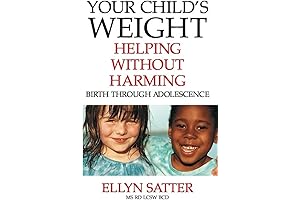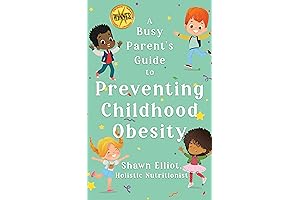· childhood obesity · 6 min read
Your Child's Weight: Helping Without Harming
Helpful advice for parents on how to approach the sensitive topic of their child's weight.
Childhood obesity is a serious problem that can lead to a number of health problems, such as heart disease, diabetes, and cancer. As a parent, it's important to monitor your child's weight and make sure they are eating a healthy diet and getting enough exercise. However, it's also important to avoid being too harsh or judgmental, as this can damage your child's self-esteem. In this article, we will provide some helpful advice on how to approach the sensitive topic of your child's weight.
Overview

PROS
- Offers practical, evidence-based guidance on promoting healthy weight management for kids
- Provides strategies to foster positive body image and self-esteem in children
CONS
- May not be suitable for children with severe weight issues or eating disorders
- Requires parental commitment and consistency to implement effectively
In this comprehensive guide, Your Child's Weight: Helping Without Harming, parents will find a treasure trove of knowledge and practical tools to support their children's healthy weight journey without resorting to harmful or restrictive measures. Drawing on the expertise of leading pediatricians and nutritionists, the book provides a wealth of evidence-based strategies for promoting positive dietary habits, fostering regular physical activity, and nurturing a healthy body image in children.
One of the key strengths of the book is its focus on the importance of a collaborative approach between parents and children. It emphasizes the value of involving children in setting goals, planning meals, and making physical activity enjoyable. By empowering parents to become partners in their children's weight management, the book fosters a sense of ownership and accountability, setting children up for long-term success. However, it's important to note that the strategies outlined in this book may not be suitable for children with severe weight issues or eating disorders, who may require more specialized medical attention.

PROS
- Expert guidance on navigating parental roles in supporting anxious children
- Practical, step-by-step approach empowers parents with effective strategies
CONS
- Somewhat lengthy and detailed for quick reference
- May require additional research for personalized solutions
This comprehensive guidebook effectively addresses the challenges of parenting anxious children, providing parents with a roadmap for understanding and supporting their child's emotional well-being. The author's expertise is evident in the practical, step-by-step approach, which empowers parents with effective strategies and evidence-based techniques. The book delves into the complexities of childhood anxiety, exploring its causes and manifestations, and offers invaluable insights into the parental role in fostering resilience and self-esteem. While the content is extensive and may require some effort to navigate, the depth of information makes it an invaluable resource for parents seeking to create a supportive environment for their anxious child.

PROS
- Simple solutions for integrating healthy eating habits into your family's routine without taking extra time out of each day.
- Practical and evidence-based tips to help you understand how to meet your child's nutritional and energy needs without resorting to fad diets or empty promises.
CONS
- Contains health information that some readers may find obvious.
- Does not include sample meal plans or recipes with specific ingredient amounts.
To help prevent childhood obesity, it is necessary to encourage healthy eating habits early in a child's development. Studying and implementing the tips in this book will aid in a busy parent's pursuit of educating their child about nutrition and energy balance. We all lead busy lives and promoting healthy choices for our family can sometimes be a big undertaking, but it is one of the greatest things a parent can do to ensure the overall health of their little one.
This book provides an understanding of the nutritional needs of children at different ages and demonstrates how to meet those needs. The author emphasizes the importance of involving children in meal planning and preparation, and she offers practical tips for making healthy eating a family affair. She also discusses the role of physical activity in maintaining a healthy weight, and she provides a wealth of information on how to encourage children to be more active.
Childhood obesity is a serious problem that can lead to a number of health problems. As a parent, it's important to monitor your child's weight and make sure they are eating a healthy diet and getting enough exercise. However, it's also important to avoid being too harsh or judgmental, as this can damage your child's self-esteem. In this article, we have provided some helpful advice on how to approach the sensitive topic of your child's weight. We hope that you find this information helpful.
Frequently Asked Questions
What are some of the health problems that childhood obesity can lead to?
Childhood obesity can lead to a number of health problems, such as heart disease, diabetes, and cancer.
How can I approach the sensitive topic of my child's weight?
It's important to be supportive and non-judgmental when talking to your child about their weight. Focus on their health and well-being, and avoid making them feel ashamed or guilty.
What are some tips for helping my child lose weight?
There are a number of things you can do to help your child lose weight, such as encouraging them to eat a healthy diet, get regular exercise, and limit their screen time.
How can I help my child maintain a healthy weight?
Once your child has lost weight, it's important to help them maintain a healthy weight. This can be done by continuing to encourage them to eat a healthy diet, get regular exercise, and limit their screen time.
What are some resources that can help me learn more about childhood obesity?
There are a number of resources available to help you learn more about childhood obesity, such as the National Institutes of Health (NIH) and the Centers for Disease Control and Prevention (CDC).






